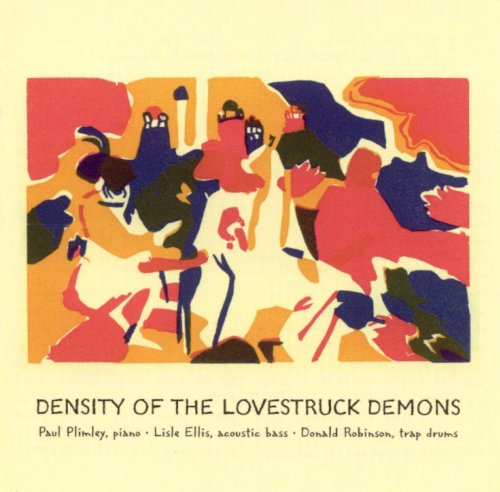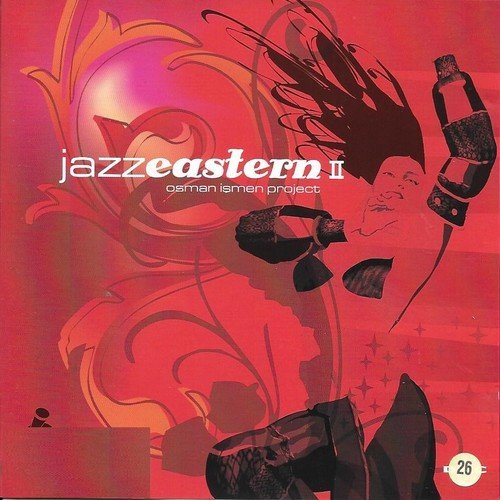Paul Plimley Trio - Density of the Lovestruck Demons (1995)

Artist: Paul Plimley Trio
Title: Density of the Lovestruck Demons
Year Of Release: 1995
Label: Music & Arts
Genre: Contemporary Jazz
Quality: FLAC (tracks+.cue, log, Artwork)
Total Time: 1:00:49
Total Size: 325 MB
WebSite: Album Preview
Tracklist:Title: Density of the Lovestruck Demons
Year Of Release: 1995
Label: Music & Arts
Genre: Contemporary Jazz
Quality: FLAC (tracks+.cue, log, Artwork)
Total Time: 1:00:49
Total Size: 325 MB
WebSite: Album Preview
01. M Tracks, Pt. 1 (5:30)
02. W.R.U. (4:02)
03. In the Hand of the Land, Eyes to the Sky (7:37)
04. Miles (5:27)
05. Ritual Advance (8:50)
06. M Tracks, Pt. 2 (4:51)
07. Trio Tuning (14:52)
I Heard It Over the Radio
The Reception
I Heard It Over the Radio
08. Density of the Lovestruck Demons (8:49)
09. Fast-Action Potion (1:30)
Canadian pianist Paul Plimley and his bass playing compadre Lisle Ellis have been making records together for over 20 years, even if no one knew about them other than a few handfuls of staunch free jazz fans in the U.S. and Europe. On his last HAT disc, Density of the Lovestruck Demons, Ellis and Plimley made a recording solely of Ornette Coleman's music. It was a creative and ardent exercise in reaching through the artist's music to the place Coleman himself reaches for: the place where tune and composer separate and the improvisation leaves the realm of music entirely to become possessed solely by the world of sound. Here, Plimley, Ellis, and drummer Donald Robinson take that a step further. Plimley's compositions dominate this recording -- and they should, as he is as fine a writer as we have in jazz -- but they are anchored in key places by three Coleman compositions, all of which are (in)famous for the amount of freedom they allow the interpretive players. The set opens with the beginning of a suite -- a thematic, really -- which holds within it several other compositions. The theme is stated briefly and Robinson establishes a slippery rhythm, which Ellis commands in a few bars. Plimley then spontaneously composes over the top, accenting chromatic changes and eighth note rows in tonal variation. This is immediately followed by a reading of Coleman's "W.R.U." The trio dynamic is revealed here for how well it works in Plimley's pianism. Coleman's theme is established firmly if fluidly by all three and carried into a mode change by the rhythm section. Here, Plimley takes off, moving in a circular fashion, further and further away from the tune until he reaches a space where the improvisation transforms itself back into the body of the thematic variation played by the rhythm section at that moment! This also happens with more focused intent on "Trio Tuning," a four-part suite which includes an alternating series of tunes by Plimley and Coleman (actually two different takes of Coleman's "I Heard It Over the Radio" are interspersed with Plimley's minor key extravaganza "The Reception"). Again, it's all thematics. The entire recording is based on these "themes and variational themes" which Plimley and Ellis concoct over solid jazz themes and rhythms. Certainly, this is free jazz, because it could be nothing else. It does swing, and it moves and pushes the boundaries of what jazz might consider itself to be, but it does so with respect for the piano lineage of the music, and with a sense of humor (check out the Vince Guaraldi quotes on "In the Hand of the Land, Eyes to the Sky"). This is one of Plimley's finest moments to date.
![Laura Anglade - Get Out of Town (Deluxe) (2026) [Hi-Res] Laura Anglade - Get Out of Town (Deluxe) (2026) [Hi-Res]](https://www.dibpic.com/uploads/posts/2026-02/1770950244_kznexew2l78jj_600.jpg)

![Seán Mac Erlaine, Caoimhín Ó Raghallaigh - Old Segotia (2025) [Hi-Res] Seán Mac Erlaine, Caoimhín Ó Raghallaigh - Old Segotia (2025) [Hi-Res]](https://img.israbox.com/img/2026-02/13/69rfun7bj67wruna9muyohy0g.jpg)
![Herbie Mann - East Coast Jazz / 4 (Remastered 2014) (2026) [Hi-Res] Herbie Mann - East Coast Jazz / 4 (Remastered 2014) (2026) [Hi-Res]](https://www.dibpic.com/uploads/posts/2026-02/1770799757_u38b9gzog0i62_600.jpg)
![Claude Williamson - Round Midnight (Remastered 2014) (2026) [Hi-Res] Claude Williamson - Round Midnight (Remastered 2014) (2026) [Hi-Res]](https://www.dibpic.com/uploads/posts/2026-02/1770854964_cover.jpg)

![Howard McGhee - Dusty Blue (Remastered 2013) (2026) [Hi-Res] Howard McGhee - Dusty Blue (Remastered 2013) (2026) [Hi-Res]](https://www.dibpic.com/uploads/posts/2026-02/1770800733_dm4oiwhycda9e_600.jpg)
![Robert Lucaciu - FALLEN CROONER (2026) [Hi-Res] Robert Lucaciu - FALLEN CROONER (2026) [Hi-Res]](https://www.dibpic.com/uploads/posts/2026-02/1770896672_rzrlbctp6z9sb_600.jpg)
